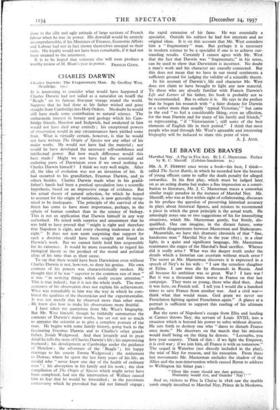LE BRAVE DES BRAVES
Marshal Ney. A Play in Five Acts. By J. C. Masterman. Preface by R. C. Sherriff. (Cobden-Sanderson. 5s.)
MR. A. P. HERBERT once wrote a book—his best, I think called The Secret Battle, in which he recorded how the bravest of young officers came to suffer the death penalty for alleged cowardice. In his first play, which must be judged later on as an acting drama but makes a fine impression as a contri- bution to literature, Mr. J. C. Masterman traces a somewhat similar tragic paradox in the instance of Marshal Ney. Mr.. Sherriff, who was at first within sight of collaborating, discusses in his preface the question of preserving historical accuracy in plays about historical figures, and rejoices to recommend a piece in which the great principle is the actual truth. He amusingly notes one or two suggestions of his for intensifying situations, which Mr. Masterman gently, but firmly, dis- qualified. One can imagine, in the distant future, some agreeable disagreements between Masterman and Shakespeare. Meanwhile, we have this dramatic chronicle of that " fine, handsome man " Marshal Ney in the year 1815 ; in a clear light, in a quiet and significant language, Mr. Masterman reanimates the stages of the Marshal's final sacrifice. Whence did it really arise ? What was the deeper truth under the details which a historian can ascertain without much error ? The secret as Mr. Masterman discovers it -is expressed • in a speech of Ney's to his wife : " I saw the senseless slaughter at. Eylau. I saw men die by thousands in Russia. And all because his ambition was so great. War ? I hate war ! But it was a thousand times worse in France on that last campaign. They were so young, those who died then. And it was here, on French soil. I tell you I would die a. hundred
times to save France from, another war. And a civil war— think what that would mean. God grant we never see
Frenchmen fighting against Frenchmen again." A glance at a portrait is sufficient to support this reading of his ultimate pacifism.
But the news of Napoleon's escape from Elba and landing at Cannes throws Ney, the servant of Louis XVIII, into. a situation which is beyond his power to solve without. disaster. He sets forth to destroy one who " dares to disturb France once more." He discovers on the march that his: mission would itself bring on the thing he detests. " Lecourbe, you love your country. Think of this : 'if we fight the Emperor, it is civil war ; if we join him, all France is with us tomorrow." The sequel is Waterloo (not directly included in the play), the trial of Ney for treason, and his execution. From these last movements Mr. Masterman excludes the shadow of the Allies and the non-intervention which caused Byron to address to Wellington his bitter pun : " Glory like yOurs should any dare gainsay, Humanity would rise, and thunder Nay ! ' " And so, visitors to Pere la Chaise in 1816 saw the marble tomb simply inscribed to Marshal Ney, Prince de la Moskowa, and perhaps saw a soldier bringing his blue cornflowers' to lay on it ; and so, Ney still " appeals to posterity." He could hardly do so more movingly, or with more of dignity, than he does in these scenes byzan English historian who has a special insight into the-'question of war and peace. Inci- dentally, Mr. Masterman has presented " the personality of Louis XVIII with equal discernment and solidity. There is one tiny point which perhaps he will reconsider : " Prince of Moscow " seems not the precise equivalent of " Prince



































 Previous page
Previous page